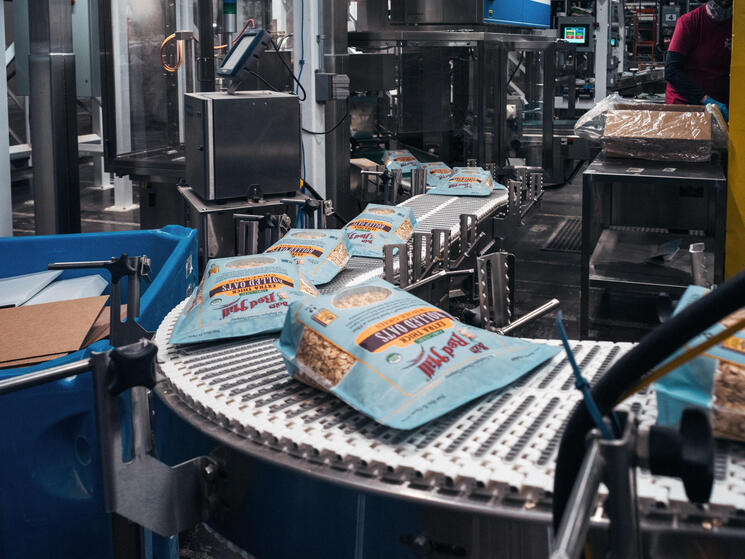
Rising to the Food Waste Challenge: Q&A with Julia Person, Bob's Red Mill
- Date: 20 December 2022
If you’re baking this holiday season, you’re likely doing the best you can to make the most of your ingredients and waste less. But it’s not just up to consumers to do their part; minimizing food waste must be a priority throughout the entire supply chain. And some companies are already rising to that challenge.
Bob’s Red Mill partnered with the Pacific Waste Food Waste Commitment, along with TripleWin Advisory, to develop an employee engagement campaign to reduce food waste in their whole grain milling and packaging facility in Milwaukie, Oregon. The details of the campaign and its results are available in a new case study here.
We caught up with Julia Person, Sustainability Manager at Bob’s Red Mill, to discuss lessons from the campaign and how and why the company is working to address food waste.

Julia Person, Sustainability Manager at Bob's Red Mill
Why is addressing food waste a priority for Bob’s Red Mill?
We’re proud to be the first manufacturer to sign onto the Pacific Coast Food Waste Commitment to collaboratively cut food waste in half by 2030, and we hope to lead the way for other companies in the Pacific Northwest. This issue is a priority for two different reasons: we know preventing food waste can help fight climate change and stop hunger, and it also makes our business more efficient and profitable. As an employee-owned company, our profits are shared with the entire team. That’s a powerful incentive for us all to work together to prevent food waste. But it’s also a natural outgrowth of our core values of Respect, Teamwork, Accountability and Determination.
You recently worked with WWF via the Pacific Coast Food Waste Commitment to develop a case study on this topic. What were the major takeaways for you during this process? Were there any surprises?
With the help of our partners, we hosted a Food Waste Reduction Challenge at the mill. We asked for ideas from all employees on how to reduce food waste in every facet of Bob’s Red Mill: from milling to packaging, to innovation, receiving, quality and also our Whole Grain Restaurant and Store. We started by asking, “Where is food wasted today that could be saved or prevented?” We were pleasantly surprised with the level of engagement from our employee owners, who submitted 176 amazing food waste reduction ideas. The ideas were thoughtful, creative and innovative, and we will be working together to implement many of them.
We tested one reduction idea and implemented a change to a whole grain packaging line. The result: a more than 70% reduction in wasted food per pound of food produced!
How has working through a public-private initiative like the PCFWC with other food businesses accelerated progress against your food waste objectives?
Undoubtedly, the support of PCFWC and learning from other food businesses has accelerated our work around food waste. Before joining, we had no formalized program, and we didn’t make the direct connection between food waste and climate change. While we have always upcycled our waste and donated edible goods, we needed a push to move beyond that framework and look at upstream prevention.

What are your plans for addressing food waste in the future?
As a result of our pilot, we’ve formed a food waste reduction team, and we’ll be approaching food waste with a continuous improvement mindset. We’ve categorized the ideas that were collected and will be working on the quick wins, gems and strategic opportunities. Many opportunities highlight the need for education and shifts in our day-to-day mindset, so we’re collaborating across departments to make preventing food waste part of our standard, default way of operating.
We also recently supported the Food Date Labeling Act, and are eager to find more ways to use our voice to spread awareness about food waste prevention.
What do you want your customers to know about food waste?
Food waste is a problem worldwide, but even as individuals, we can make a big impact! We want our customers to know that food waste is one of the top solutions for combatting climate change, and each of us can make a difference as individuals. Americans currently throw out about 1,250 calories of food per day, per person. But by buying less food, preparing and eating it in a timely manner, and composting leftover scraps, we can save money, combat climate change and reduce our carbon footprint.
What do you want other food manufacturers who may just be starting their journey to address food waste to know?
Food waste can be a complex issue for food manufacturers for many reasons, but just know—some of the best ideas may come from your employees. Ask them where they see opportunities, listen to their expertise, and test out a “quick win” to foster engagement and buy-in. Once people understand the impact they can make and the overall benefit to the company, it’s much easier to instill this mission into your everyday work life. Plus, you have a network of other committed manufacturers to collaborate with through the PCFWC!